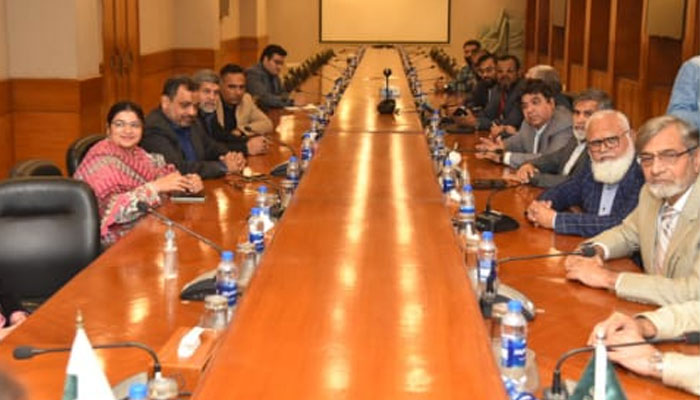Trade bodies seek policy reforms to boost Karachi’s business and industry
FPCCI and KATI discussed challenges faced by Karachi's industrial sector, such as high energy tariffs, expensive land prices
KARACHI: The Federation of Pakistan Chambers of Commerce & Industry (FPCCI) and the Korangi Association of Trade & Industry (KATI) have agreed to work together to make Karachi more conducive for business and industry, by raising their common concerns and seeking policy reforms from the government.
The two trade bodies held a meeting on Monday, where they discussed the challenges faced by Karachi's industrial sector, such as high energy tariffs, expensive land prices, steep interest rates, and lack of support for micro, small and medium enterprises (MSMEs).
Atif Ikram Sheikh, president of FPCCI, said that the central bank's key policy rate of 22 percent was a major hurdle for the industrial growth, as it made borrowing unaffordable for most businesses.
"The minimum we want is a regionally-competitive interest rate regime," Sheikh said in a statement. He also called for rationalising the electricity and gas tariffs, which he said had increased the cost of doing business and made Pakistani products less competitive in the export market.
"This will propel us into a vicious circle of higher cost of doing business; uncompetitive prices in export market; decline in export orders; even wider trade deficit and further strain on foreign exchange reserves, if energy prices are not rationalized."
Sheikh also proposed that the term of non-filers should be dropped, as it was not used anywhere else in the world, and that the computerized national identity card (CNIC) number should be adopted as the National Tax Number (NTN) for everyone.
He said that there were many ways to identify tax evaders, such as utility bills, international travel, ownership of luxury vehicles, and payment of high-end school fees. Saquib Fayyaz Magoon, senior vice president of FPCCI, said that the price of an acre of land in industrial zones had climbed up to Rs300-350 million, which made it impossible for new industries to set up or existing ones to expand.
Magoon also pointed out that the drug regulatory authority of Pakistan (DRAP) should stop its high-handed approach and start a consultative process with the pharmaceutical manufacturers to adjust the retail prices of the life-saving drugs.
"Due to the inaction of DRAP, many life-saving drugs were short in the market and it was encouraging the smuggling of medicines." Zubair Chhaya, deputy patron-in-chief of KATI, reiterated that the representation of small and medium enterprises was of utmost importance, and that the need of the hour was to establish clusters for them to set up cottage, small and medium enterprises on the lines of industrial zones.
He said SMEs were an integral part of the supply and sourcing lines of the export-oriented industries, and that the federal and provincial governments should facilitate them with the provision of land.
The KATI delegation also expressed their concerns over the introduction of section 7-E in the income tax ordinance (ITO 2001), which was applicable from the tax year 2022, and which they said had increased the notice manufacturing practices of the Federal Board of Revenue (FBR) and made taxpayers, law-abiding citizens, have sleepless nights.
Nighat Awan, acting president of KATI, said that there were FBR reforms in the pipeline, and that the business community as a whole must act fast to get themselves on board of the reforms committee to make sure that these reforms were not carried out in a consultation-less manner.
-
 China Confirms Visa-free Travel For UK, Canada Nationals
China Confirms Visa-free Travel For UK, Canada Nationals -
 Inside Sarah Ferguson, Andrew Windsor's Emotional Collapse After Epstein Fallout
Inside Sarah Ferguson, Andrew Windsor's Emotional Collapse After Epstein Fallout -
 Bad Bunny's Star Power Explodes Tourism Searches For His Hometown
Bad Bunny's Star Power Explodes Tourism Searches For His Hometown -
 Jennifer Aniston Gives Peek Into Love Life With Cryptic Snap Of Jim Curtis
Jennifer Aniston Gives Peek Into Love Life With Cryptic Snap Of Jim Curtis -
 Prince Harry Turns Diana Into Content: ‘It Would Have Appalled Her To Be Repackaged For Profit’
Prince Harry Turns Diana Into Content: ‘It Would Have Appalled Her To Be Repackaged For Profit’ -
 Prince William's Love For His Three Children Revealed During Family Crisis
Prince William's Love For His Three Children Revealed During Family Crisis -
 Murder Suspect Kills Himself After Woman Found Dead In Missouri
Murder Suspect Kills Himself After Woman Found Dead In Missouri -
 Sarah Ferguson's Plea To Jeffrey Epstein Exposed In New Files
Sarah Ferguson's Plea To Jeffrey Epstein Exposed In New Files -
 Prince William Prepares For War Against Prince Harry: Nothing Is Off The Table Not Legal Ways Or His Influence
Prince William Prepares For War Against Prince Harry: Nothing Is Off The Table Not Legal Ways Or His Influence -
 'How To Get Away With Murder' Star Karla Souza Is Still Friends With THIS Costar
'How To Get Away With Murder' Star Karla Souza Is Still Friends With THIS Costar -
 Pal Reveals Prince William’s ‘disorienting’ Turmoil Over Kate’s Cancer: ‘You Saw In His Eyes & The Way He Held Himself’
Pal Reveals Prince William’s ‘disorienting’ Turmoil Over Kate’s Cancer: ‘You Saw In His Eyes & The Way He Held Himself’ -
 Poll Reveals Majority Of Americans' Views On Bad Bunny
Poll Reveals Majority Of Americans' Views On Bad Bunny -
 Wiz Khalifa Thanks Aimee Aguilar For 'supporting Though Worst' After Dad's Death
Wiz Khalifa Thanks Aimee Aguilar For 'supporting Though Worst' After Dad's Death -
 Man Convicted After DNA Links Him To 20-year-old Rape Case
Man Convicted After DNA Links Him To 20-year-old Rape Case -
 Royal Expert Shares Update In Kate Middleton's Relationship With Princess Eugenie, Beatrice
Royal Expert Shares Update In Kate Middleton's Relationship With Princess Eugenie, Beatrice -
 Andrew Mountbatten-Windsor’s Leaves King Charles With No Choice: ‘Its’ Not Business As Usual’
Andrew Mountbatten-Windsor’s Leaves King Charles With No Choice: ‘Its’ Not Business As Usual’




